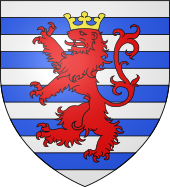Luxembourg is a parliamentary representative democratic monarchy, whereby the prime minister is the head of government, and the multi-party system. Executive power is under the constitution of 1868, as amended, exercised by the government, by the grand duke and the Council of Government (cabinet), which consists of a prime minister and several other ministers. Usually, the prime minister is the leader of the political party or coalition of parties having the most seats in parliament. Legislative power is vested in both the government and parliament. The judiciary is independent of the executive and the legislature.

Luxembourg, also known as Luxembourg City, is the capital city of Luxembourg and the country's most populous commune. Standing at the confluence of the Alzette and Pétrusse rivers in southern Luxembourg, the city lies at the heart of Western Europe, situated 213 km (132 mi) by road from Brussels and 209 km (130 mi) from Cologne. The city contains Luxembourg Castle, established by the Franks in the Early Middle Ages, around which a settlement developed.
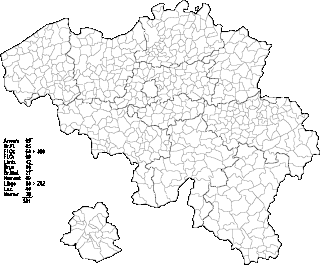
Belgium comprises 581 municipalities, 300 of them grouped into five provinces in Flanders and 262 others in five provinces in Wallonia, while the remaining 19 are in the Brussels Capital Region, which is not divided in provinces. In most cases, the municipalities are the smallest administrative subdivisions of Belgium, but in municipalities with more than 100,000 inhabitants, on the initiative of the local council, sub-municipal administrative entities with elected councils may be created. As such, only Antwerp, having over 500,000 inhabitants, became subdivided into nine districts. The Belgian arrondissements, an administrative level between province and municipality, or the lowest judicial level, are in English sometimes called districts as well.

Esch-sur-Alzette is a city in the Grand Duchy of Luxembourg and the country's second-most populous commune, with a population of 36,625 inhabitants, as of 2023. It lies in the south-west of the country, on the border with France and in the valley of the Alzette, which flows through the city. The city is usually referred to as just Esch; however, the full name distinguishes it from the village and commune of Esch-sur-Sûre which lies 45 kilometres further north. The country's capital, Luxembourg City, is roughly 15 km (9.3 mi) to the north-east. Esch was selected as the European Capital of Culture for 2022, alongside Kaunas and Novi Sad.

The Democratic Party, is the major liberal political party in Luxembourg. One of the three major parties, the DP sits on the centre to centre-right, holding moderate market liberal views combined with a strong emphasis on civil liberties, human rights, and internationalism.
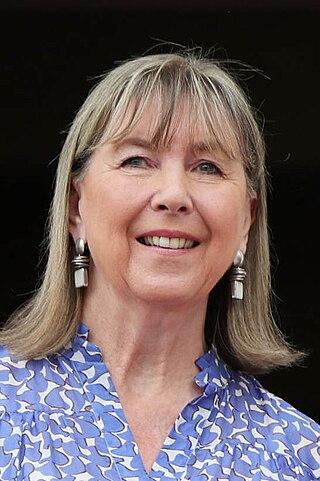
Lydie Polfer is a Luxembourgish politician who has served in a number of capacities, including Deputy Prime Minister, Minister for Foreign Affairs, and Mayor of Luxembourg City, as well as a Member of the European Parliament (MEP) and a member of the Chamber of Deputies. She is a member of the Democratic Party (DP).

Bertrange is a commune and town in south-western Luxembourg. It is located 6.5 km west of Luxembourg City.
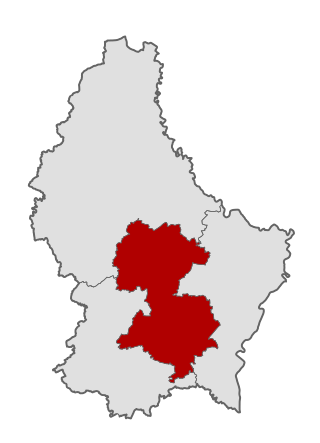
Centre is one of the four multi-member constituencies of the Chamber of Deputies, the national legislature of Luxembourg. The constituency was established in 1919 following the introduction of proportional representation for elections to the Chamber of Deputies. It consists of the cantons of Luxembourg and Mersch. The constituency currently elects 21 of the 60 members of the Chamber of Deputies using the open party-list proportional representation electoral system. At the 2023 general election it had 81,687 registered electors.

Claude Meisch is a Luxembourgish politician with a degree in financial mathematics from Trier university. Meisch was appointed Minister of Education in 2013 in the government of Xavier Bettel, a post he held until 2023. He was appointed Minister of Education and Youth and as Minister of Housing in 2023 in the government of Luc Frieden He has been a member of the Chamber of Deputies from 1999 to 2013 and Mayor of Differdange since 2002. He was President of the Democratic Party (DP) from 2004 until 2013, of which he has been a member since 1994.
The following is a list of events that happened in 1999 in the Grand Duchy of Luxembourg.
The following lists events that happened during 1981 in the Grand Duchy of Luxembourg.

The Juncker–Polfer Government was the government of Luxembourg between 7 August 1999 and 31 July 2004. It was led by, and named after, Prime Minister Jean-Claude Juncker and Deputy Prime Minister Lydie Polfer.

Camille Polfer was a Luxembourgish politician and teacher.
An échevin, sometimes translated as alderman, is a member of the administration of a Luxembourgish commune. Together, they form the collège échevinal, which helps the mayor run the administration. In most communes, échevins have designated roles within the administration, adopting separate briefs as in a cabinet.

The Council of Paris is the deliberative body responsible for governing Paris, the capital of France. It possesses both the powers of a municipal council and those of a departmental council for the département de Paris, as defined by the so-called PLM Law of 1982 that redefined the governance of Paris, Lyon and Marseille. Paris is the only territorial collectivity in France to be both a commune and a département.
General elections were held in Luxembourg on 7 June 2009, together with the 2009 election to the European Parliament. All sixty members of the Chamber of Deputies were elected for five years. The polls were topped by the Christian Social People's Party, which built upon its already high number of seats to achieve a commanding victory, with the highest vote share and number of seats of any party since 1954. Incumbent prime minister Jean-Claude Juncker, who was the longest-serving head of government in the European Union, renewed the coalition agreement with Deputy Prime Minister and Luxembourg Socialist Workers' Party leader Jean Asselborn and formed the Juncker-Asselborn Ministry II, which was sworn in on 23 July 2009.
The 2005 Luxembourgish communal elections were held on 9 October 2005. Elections are held every six years across all of Luxembourg's then-118 communes.

Xavier Bettel is a Luxembourgish lawyer and politician who serves as the 14th deputy prime minister of Luxembourg and as the minister for Foreign Affairs since 2023. He served as the 24th prime minister of Luxembourg from 2013 to 2023. He was a member of the Chamber of Deputies (1999–2013) and Mayor of Luxembourg City (2011–2013).
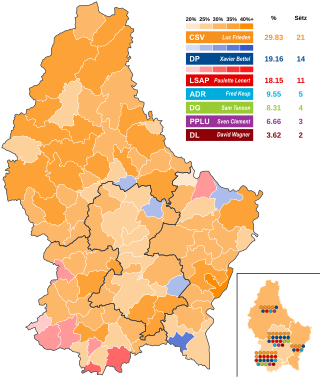
General elections were held in Luxembourg on 8 October 2023 to elect all 60 seats of the Chamber of Deputies.
Christos Floros is a Greek-born Luxembourgish politician, civil rights campaigner and architect. He is a member of the Democratic Party (DP). As of October 2024, he leads the International wing of the party. He was a candidate in the 2024 European Elections for Member of the European Parliament.
